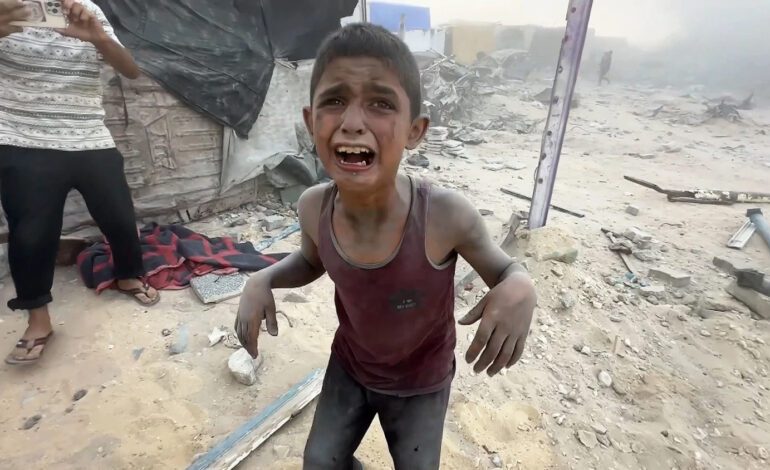On Thursday, Israeli Prime Minister Benjamin Netanyahu told President Biden he has decided to send a delegation to resume stalled negotiations on a hostage release deal with Hamas, their administrations said.
A source in the Israeli negotiating team, speaking on condition of anonymity, said there was a real chance of achieving agreement after Hamas made a revised proposal on the terms of a deal.
“The proposal put forward by Hamas includes a very significant breakthrough,” the source said.
The Israeli response to the Hamas proposal, submitted via mediators, was in marked contrast to past instances during the nearly nine-month war in Gaza, where Israel has said the conditions attached by Hamas were not acceptable.
U.S. sees “breakthrough” in Israel-Hamas talks, senior official says
Hamas made a pretty significant adjustment in its position over a potential hostage release deal with Israel, a senior U.S. administration official said on Thursday, expressing hope that it would lead to a pact that would be a step to a permanent ceasefire.
“We’ve had a breakthrough,” the official told reporters on a conference call, adding there were still outstanding issues related to implementation of the agreement and that a deal was not expected to be closed in a period of days.
“We do believe there is a pretty significant opening here, and we welcome the prime minister’s readiness to try to seize that opening by empowering his negotiating team to engage directly” in Doha here over the coming days,” the official said.
An Israeli official said the head of Israel’s Mossad intelligence agency would lead the Israeli delegation for the talks.
Netanyahu was scheduled later on Thursday to have consultations with his negotiating team, then discuss the hostage release talks with his security cabinet.
The White House said Biden and Netanyahu, on a phone call, discussed the response received from Hamas on possible terms of a deal.
“The president welcomed the prime minister’s decision to authorize his negotiators to engage with U.S., Qatari and Egyptian mediators in an effort to close out the deal,” it said in a statement.
In the phone call, Netanyahu repeated his position that Israel would only end its war in Gaza when all its objectives had been achieved, his office said in a statement.
“There’s a deal with a real chance of implementation,” the source in the Israeli negotiating team said.
The source cautioned, though, there was a risk a deal could be scuppered by “political considerations.”
Some far-right partners in Netanyahu’s ruling coalition have indicated they may quit the government if the war ends before Hamas is destroyed. Their departure from the coalition would likely end Netanyahu’s premiership.
Hamas flexibility
On Wednesday, Israel received Hamas’ response to a proposal Biden made public at the end of May that would include the release of about 120 hostages held in Gaza and a ceasefire in the Palestinian enclave.
A Palestinian official close to the mediation effort told Reuters that Hamas, the militant group that controls Gaza, has shown flexibility over some clauses that would allow a framework agreement to be reached should Israel approve.
Two Hamas officials did not immediately respond to requests for comment. Hamas has said any deal must end the war and bring a full Israeli withdrawal from Gaza. Israel maintains it will accept only temporary pauses in the fighting until Hamas is eradicated.
The plan entails the gradual release of Israeli hostages still being held in Gaza and the pullback of Israeli forces over the first two phases, and the freeing of Palestinian prisoners. The third phase involves the reconstruction of the war-shattered territory and return of the remains of deceased hostages.
It was not clear where the Israeli delegation would go to resume the talks. Prior efforts to end the Gaza conflict were mediated by Egypt and Qatar, with talks held in both locations.
On Thursday, Gaza’s health ministry said the Palestinian death toll in the nearly nine months of war had passed 38,000, with 87,445 wounded. The health ministry does not distinguish between civilians and fighters in its figures.
The war in Gaza began when Hamas-led gunmen burst into southern Israel on Oct. 7, killed 1,200 people and took around 250 hostages back into Gaza, according to Israeli tallies.
“Enough is enough”
In Gaza, Palestinians reacted cautiously to the prospect of renewed talks.
“We hope that this is the end of the war; we are exhausted and we can’t stand more setbacks and disappointments,” said Youssef, a father-of-two, now displaced in Khan Younis, in the south of the enclave.
“Every more hour into this war, more people die, and more houses get destroyed, so enough is enough,” he told Reuters via a chat app. “I say this to my leaders, to Israel and the world.”
An Israeli strike hit a school in Gaza City and the Civil Emergency Service said five Palestinians were killed and others wounded, while other Israeli strikes on Gaza City’s old town on Thursday killed a woman and wounded several others, medics said.
– Reuters. Edited for style.






Leave a Reply